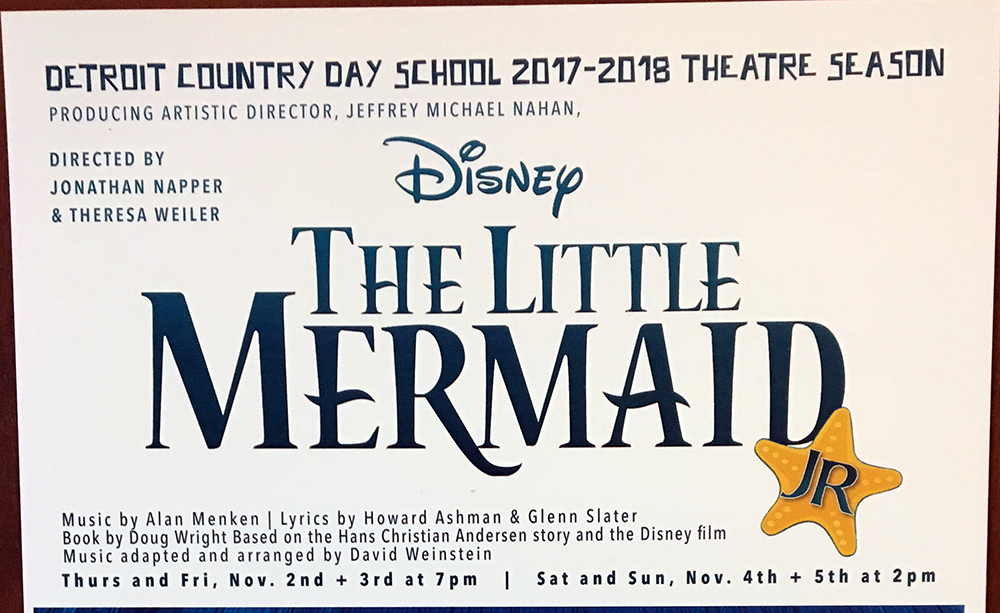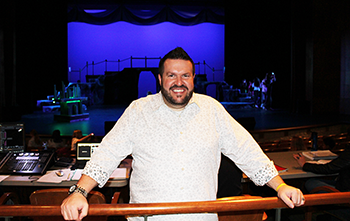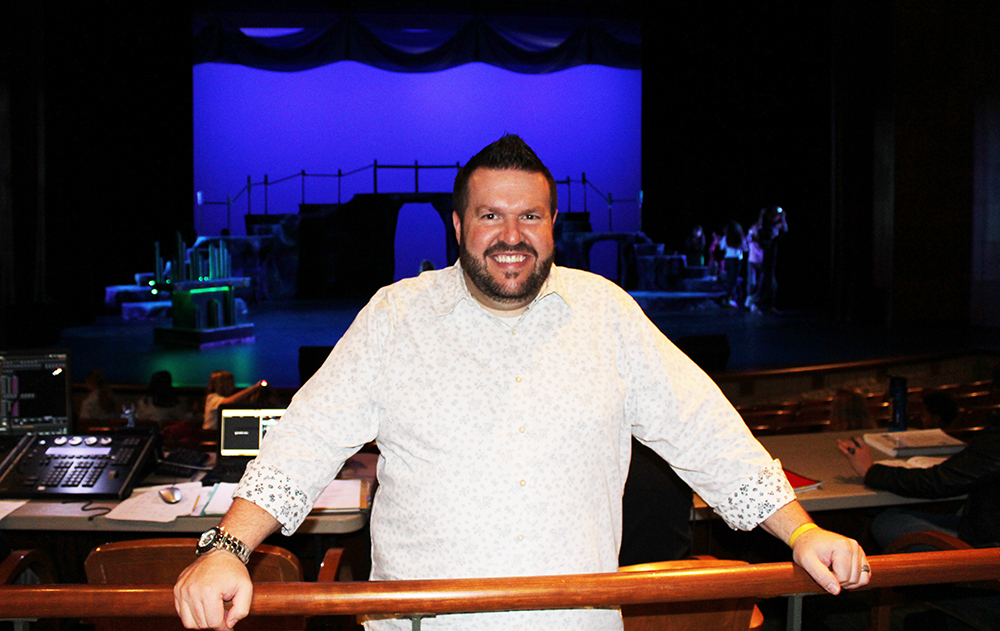“Great educators are always pushing themselves to learn something new every day. Whether that is through personal professional development, or through an official course of study, that quest for knowledge and self-improvement led me to pursue this degree.” –Mr. Napper, Graduate Student Research Assistant in the Master of Arts in Arts Administration program.
Jonathan Napper earned his music education bachelor’s from Western Michigan University and has also taken master’s level courses with Oakland University. In his fourth year as a music/drama teacher at Detroit Country Day School (19th overall), co-workers credit his success to his hard-work: “Mr. Napper puts a whole lot of passion and love into these performances. The kids love him and we’re lucky to have him,” said one of his stage managers.
I visited Mr. Napper on the set DCDS’s version of Disney’s The Little Mermaid in which he was directing tech rehearsals. Even though he was managing over 70 students in grades 4-12, Mr. Napper was gracious enough to answer some questions for future graduate students.
Why did you select UM-Flint for your graduate studies?
I was intrigued by the Arts Administration degree, in particular, and loved the fact that UM-Flint was so close for me to commute and take classes. Being in the classroom, where you can interact with your peers and future colleagues is very important, and is something that you can’t always get from an online class. Building that sense of trust and making contact with people in the classroom helps to foster discussion and the sharing of ideas.
Why would an educator, such as yourself, want to pursue this master’s degree?
Great educators are always pushing themselves to learn something new every day. Whether that is through personal professional development, or through an official course of study, that quest for knowledge and self-improvement led me to pursue this degree. So much of what we learn in our undergraduate level programs is about how to teach and very little is about the administration of a performing arts program, so in addition to being able to apply what I’m learning to my classroom and program, and I am also planning for the future, in the hopes that I will eventually head an entire fine, performing, and communication arts program.
How many performances have you been a part of?
I have been playing the saxophone for 30 years now, and over the years I have performed with countless school, community, and professional bands both locally and abroad. I also make it a point to perform in the pit orchestra for several local community theaters as a reed doubler. As an educator, I have been a part of over 25 different theatrical productions ranging from Junior Versions of The Little Mermaid and Shrek, to Oliver!, West Side Story, Ain’t Misbehavin’, Annie, Fiddler on the Roof, and Legally Blonde to name a few.
Which have been your favorite?
This is my second journey “Under the Sea” with a middle school production of The Little Mermaid Jr, and I love the production value and energy of the show. My time as a working college musician with the All-American College Orchestra at Disney World had a profound affect on me as well, but I have extremely fond memories of the first show I ever conducted the pit orchestra for, and that was Pirates of Penzance.
What is something that has surprised you about UM-Flint?
The connections that the faculty have to outside community has been impressive to see, and the work that they are doing outside of the classroom to keep the content relevant is certainly impressive. It is easy to become insulated in academia, and the fact that the UM-Flint faculty are active in their fields outside of the classroom is important to me.
What sets the Arts Admin program apart?
Having the opportunity to experience the program in action through visits to the Flint Youth Theater and guest speakers sheds real world light on our readings and course study. I am also impressed by the variety of backgrounds that my classmates bring with them. Having an opportunity to collaborate with professionals in the visual arts, business or nonprofit, performing arts, and education communities is invaluable.
Employers tell us UM-Flint graduates exhibit unique qualities that help them excel in real working environments. Can you describe some of the ways UM-Flint has prepared you for greater success in the real world?
I have been able to apply concepts and have discussions with colleagues and administrators at my school about topics we have covered in my short time of study already. Knowing, or having a better understanding, of where everyone in the creative team is coming from has helped me be a better leader through the production process and will certainly help me in future productions.
Who is the person who has made the biggest impact on your UM-Flint career (professor, advisor, mentor, fellow student, alum, etc.)? And how?
Having the opportunity to work beside Nicole Broughton as a student and a Graduate Student Research Assistant is providing me a lot of insight into the professional performing arts world. Seeing how they deal with a lot of the same issues we deal with in educational performing arts is providing me with different ways of thinking and new solutions to similar situations.
What is something you think UM-Flint’s Art Admin program should brag about more? What do they do especially well? Better than anyone else?
I can’t stress how important it is for the faculty to be active in the field about which they are teaching. Keeping a foot in “the real world” has made all of the difference in my experience so far. Keeping discussion topics relevant and being able to apply our studies and assignments to current events in the arts takes theoretical knowledge to applied knowledge, and drives home that what we are learning really matters and will actually be used by us once we graduate.



